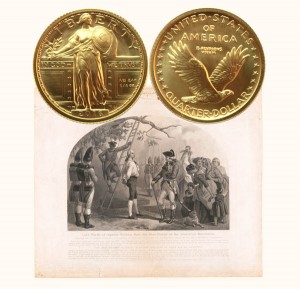Today, the Standing Liberty Gold Quarter Coin remembers the execution of a brave revolutionary soldier 240 years ago.
An excerpt from Nathan Hale by Jean Christie Root, published in 1915:
=====
Up to this point, the early or late evening of the 21st, there is more or less of unsolvable mystery in regard to Nathan Hale’s movements; but from the memoirs of Captain William Hull, Nathan Hale’s college friend and companion in arms, we have what appears to be unimpeachable evidence as to Hale’s arrest and being brought to General Howe’s headquarters.
We quote from Captain Hull the information he received from an English officer through a flag of truce:
“I learned the melancholy particulars from this officer, who was present at Hale’s execution and seemed touched by the circumstances attending it.
“He said that Captain Hale had passed through their army, both of Long Island and [New] York Island. That he had procured sketches of the fortifications, and made memoranda of their number and different positions.
“When apprehended, he was taken before Sir William Howe, and these papers, found concealed about his person, betrayed his intentions.
“He at once declared his name, his rank in the American army, and his object in coming within the British lines.
“Sir William Howe, without the form of a trial, gave orders for his execution the following morning. He was placed in the custody of the provost marshal.
“Captain Hale asked for a clergyman to attend him. His request was refused.
“He then asked for a Bible ; that too was refused.
“‘On the morning of his execution,’ continued the officer, ‘my station was near the fatal spot, and I requested the provost marshal to permit the prisoner to sit in my marquee while he was making the necessary preparations. Captain Hale entered; he was calm, and bore himself with gentle dignity. He asked for writing materials, which I furnished him; he wrote two letters, one to his mother and one to a brother officer. He was shortly summoned to the gallows. But a few persons were around him.'”
He was condemned to die in the early morning of the 22d, but in the confusion prevailing throughout the city on account of the spreading fire, at one time threatening the whole town, Provost Marshal Cunningham must have been that morning very fully occupied, and it was late in the forenoon before he completed his preparations for Hale’s execution.
At eleven o’clock Cunningham was ready, and, as it proved, Nathan Hale was ready also. Quietly standing among the few who had gathered to see him die, and it is said in response to a taunt from Cunningham that if he had any confession to make now was the time to make it, Hale responded, glancing briefly at Cunningham and then calmly at the faces about him, “I only regret that I have but one life to lose for my country.”
For once in his life Cunningham must have been astounded. With no plea for mercy, no shrinking from the worst that Cunningham could do, this man, still almost a boy in years, had shown himself utterly beyond his power — had lifted himself forever from the doom of a victim to the grand estate of a victor.
One sharp, brief struggle and Nathan Hale was free — dead, but victorious!
Indefinite as are most of the details, there are some unwritten points that may confidently be assumed.
That 22d of September was a Sabbath day, a day associated in Nathan Hale’s mind with religious observances; prayers at the family altar, readings of the Bible, and gatherings of his friends within church walls.
Whether or not his family knew the dangerous quest on which he had ventured, he knew that he was not absent from their memories, and that the family were bearing him in their thoughts that Sabbath morning.
No other day could have made that assurance so real to him, and this thought was probably one of his strongest earthly consolations and inspirations while he was awaiting the slow but relentless preparations for his death.
No wonder that he bore himself “calmly and with dignity,” as Captain Montressor said of him.
No wonder that he died bravely — seemingly without a tremor of soul. In his last words Nathan Hale, true and faithful in every relation and every act of his brief life, gave to his country more than his life, more than all the hopes he was relinquishing so freely for her sake.
In one short, indomitable breath of patriotism, he uttered words that will be forgotten only when American history ceases to be read.
=====
The Standing Liberty Gold Quarter Coin shows with an artist’s image, circa 1858, of the execution of Nathan Hale.
